.jpg)
On August 28, 2025, in Ho Chi Minh City, within the framework of the Legal Management Series in Ho Chi Minh City 2025 (LMS 2025), the Vietnam International Arbitration Centre (VIAC) and the Investment and Trade Promotion Centre of Ho Chi Minh City (ITPC) successfully co-organized the Conference on “Real estate transactions under the fluctuation of market and legal framework” The event gathered many leading experts in the field and over 200 delegates representing real estate enterprises, investors, and lawyers.

Ms. Hồ Thị Quyên - Deputy Director of HCMC Investment & Trade Promotion Centre (ITPC)
In the Opening Remarks, Ms. Hồ Thị Quyên - Deputy Director of ITPC, emphasized that real estate plays a crucial role as a driving force for economic growth with spillover effects on many other sectors. According to Ms. Quyên, in recent years, with the support of new government policies, the real estate market has grown rapidly, opening up numerous opportunities for investors and businesses. However, alongside this development come challenges - particularly as the legal framework continues to evolve. Therefore, enabling enterprises to access information, exchange views, and develop a comprehensive understanding of real estate transactions amid market and legal fluctuations is of great practical significance. Such efforts aim to promote a transparent, safe, and sustainable real estate investment environment.
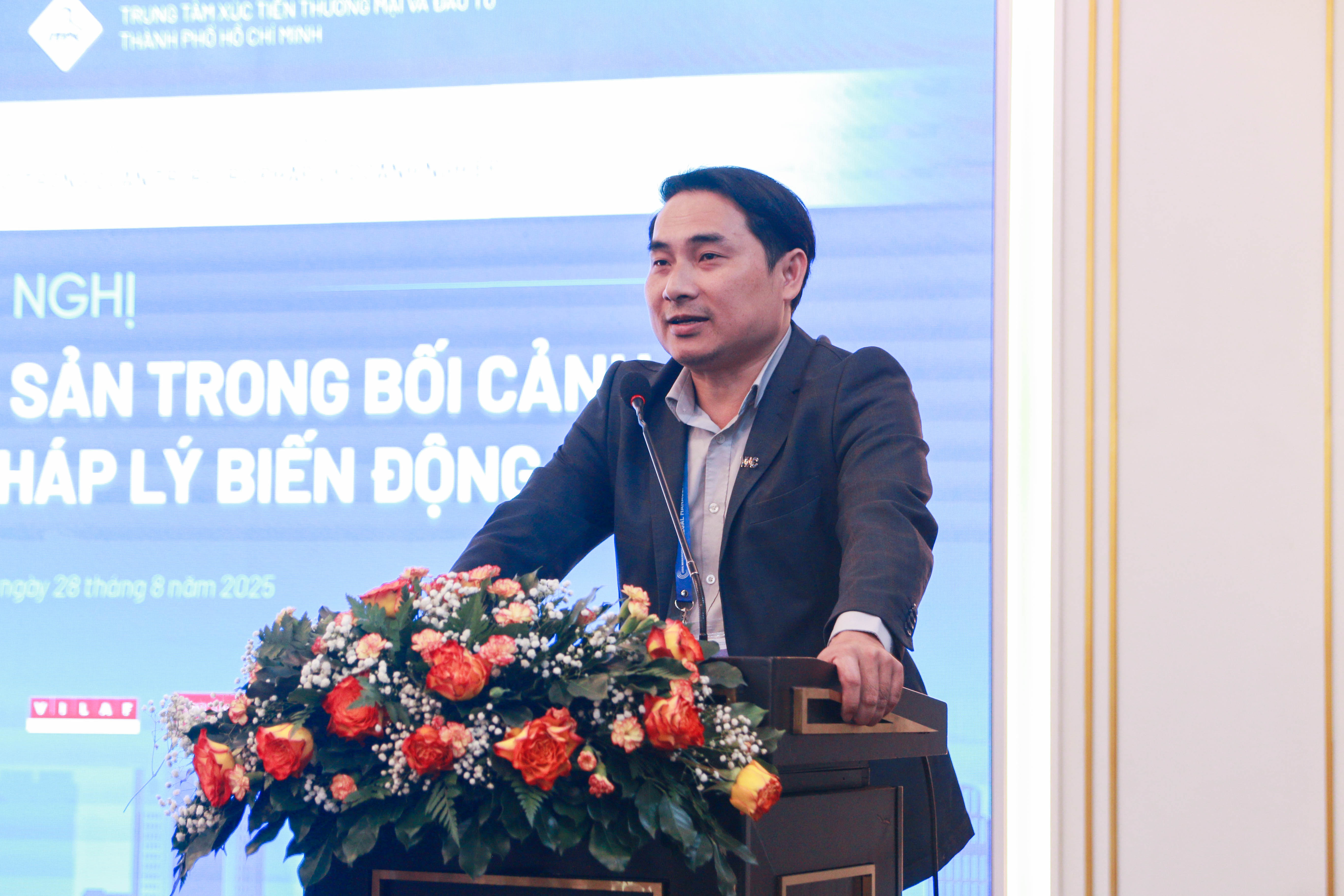
Mr. Châu Việt Bắc - Deputy Director of the VIAC Ho Chi Minh City Branch
Following that, Mr. Châu Việt Bắc - Deputy Director of the VIAC Ho Chi Minh City Branch cum Vice Secretary-General of VIAC, shared his insights. Mr. Bắc noted that real estate-related disputes consistently account for a large proportion of cases resolved at VIAC. In 2024 alone, real estate ranked third, comprising 14% of total disputes. He attributed this to previous inadequacies in the legal framework. However, he expressed optimism that recent reforms such as the Land Law 2024 and the Law on Real Estate Business 2023 would make future transactions more efficient and secure.
Mr. Bắc also stressed that, in addition to institutional reforms, business proactiveness is key. Enterprises must equip themselves with legal knowledge, stay updated on regulatory changes, and strengthen risk management capabilities to seize opportunities in the new legal environment while minimizing potential disputes.
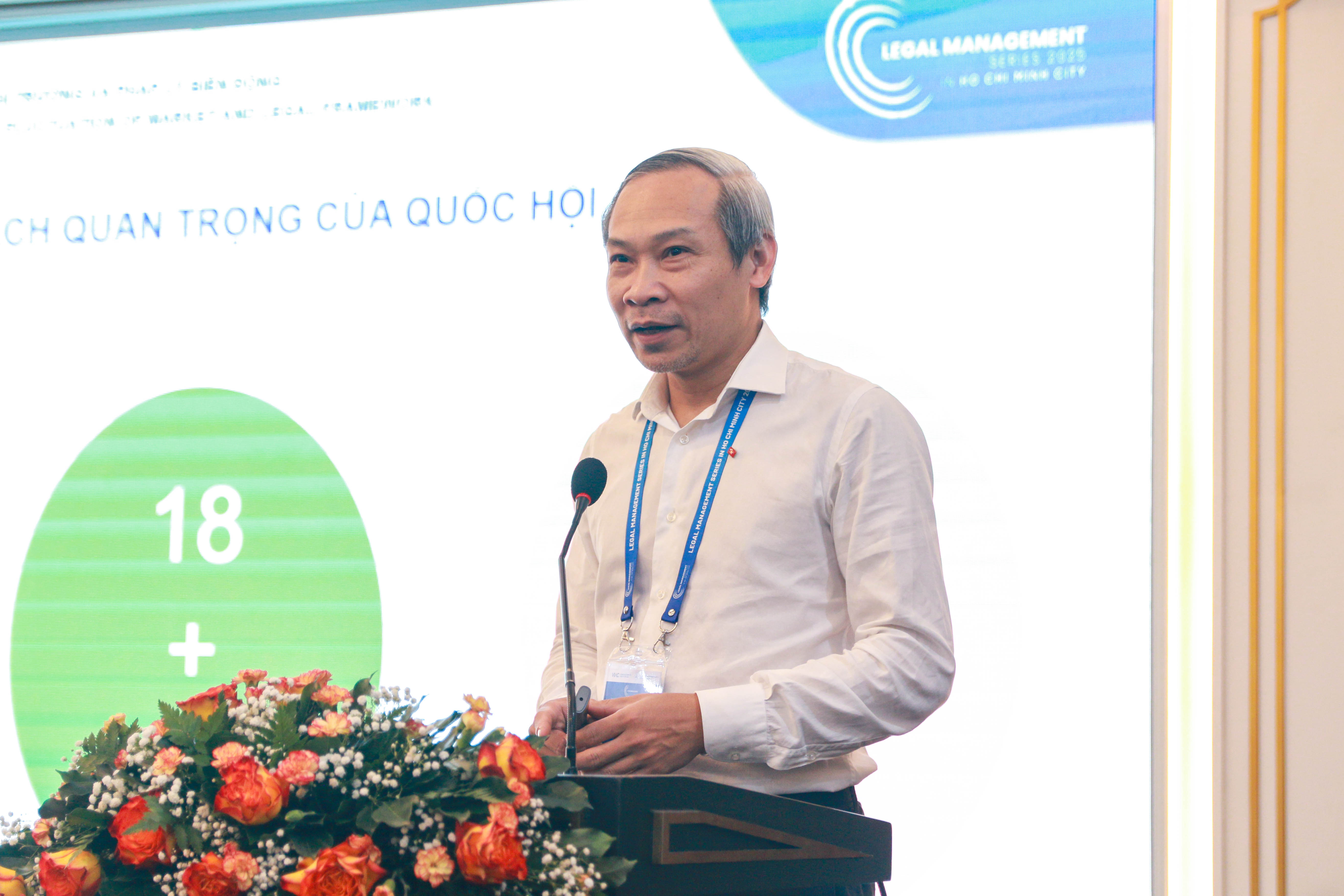
Mr. Phan Đức Hiếu - Standing Member of the National Assembly’s Economic and Financial Committee, Arbitrator at VIAC
At the conference, Mr. Phan Đức Hiếu - Standing Member of the National Assembly’s Economic and Financial Committee, Arbitrator at VIAC delivered the keynote presentation, updating participants on new investment and business policies and offering recommendations for real estate enterprises. He highlighted that Resolution No. 198 issued on May 17, 2025 on special mechanisms and policies for developing the private sector, concretized the spirit of the earlier Resolution No. 68. The new resolution introduces various incentives and supports for enterprises that comply with regulations on inspection, supervision, and investment in the “green and digital” sectors. It also provides mechanisms to facilitate access to land, infrastructure investment, and land fund prioritization.
Regarding investment, construction, and real estate business activities, Mr. Hiếu noted that the regulatory framework has undergone many changes and is expected to see further amendments. Notably, Law No. 90/2025/QH15, which revises eight laws including those on Investment, PPP, and Bidding introduces adjustments to the authority for approving investment policies, including residential housing projects (for sale, lease, or lease-purchase) and projects developing infrastructure in industrial and export processing zones.
Concerning the social housing segment, Mr. Hiếu also discussed Resolution No. 201/2025/QH15 on piloting specific mechanisms and policies, providing recommendations for businesses on conditions and procedures for transactions involving this type of real estate. For land-use-related projects, he analyzed key amendments in the new Land Law, particularly those on land-use planning, land recovery, land lease payment mechanisms (one-time and annual payments), and land valuation. With these updates, he urged real estate enterprises and investors to carefully assess their needs and consider new legal and procedural changes to ensure lawful and safe transactions. He also noted that the National Assembly will continue reviewing and passing 48 new laws and resolutions, many of which are highly significant, thus, businesses must stay informed and agile to adapt effectively and maintain stable operations.
The conference featured two discussion panels, focusing on 02 major themes: (i) Trading land use rights with technical infrastructure in real estate projects, and (ii) Trading off-plan housing and construction works.
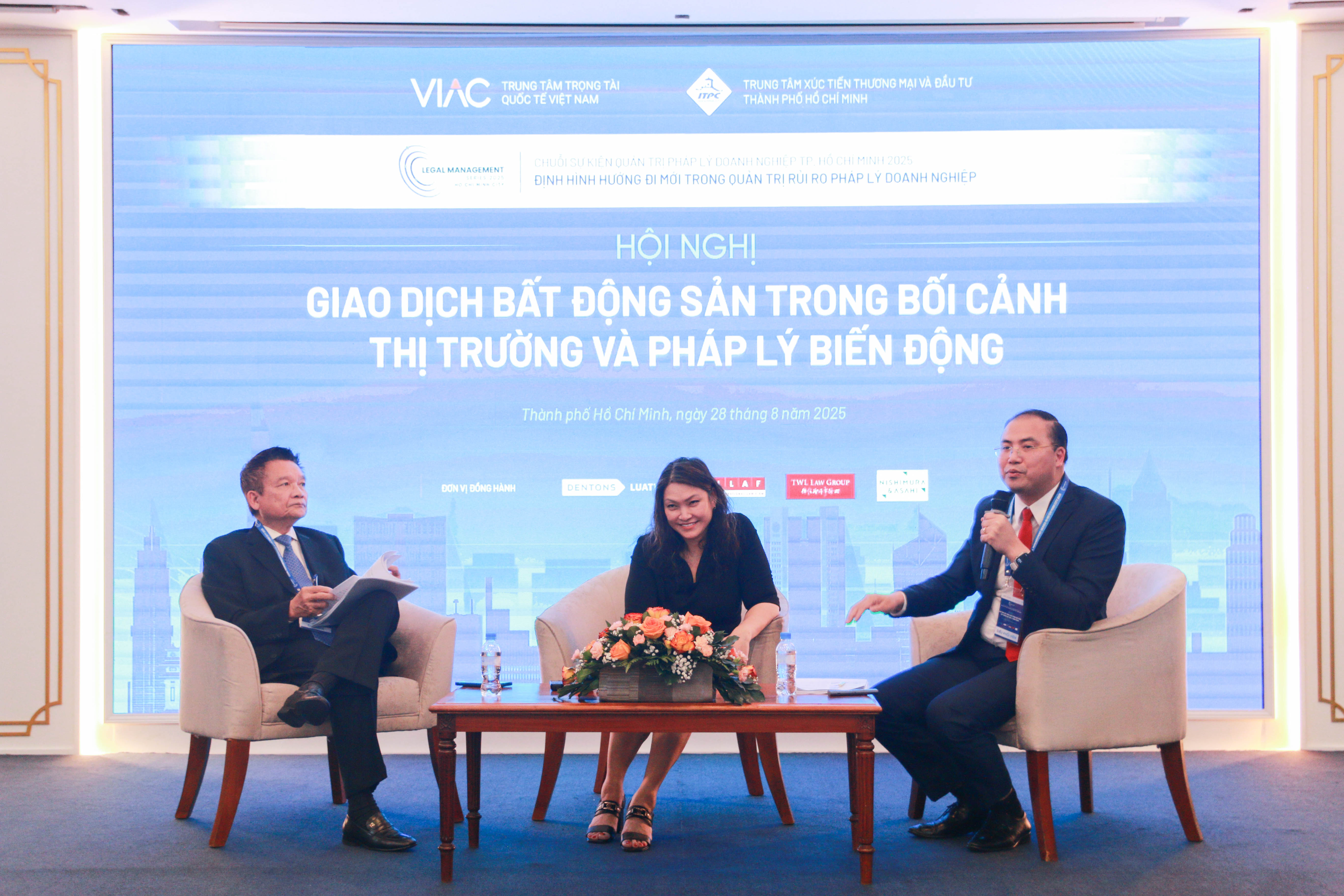
Discussion Panel 1 moderated by Mr. Vũ Lê Bằng - Managing Partner at Nishimura & Asahi Vietnam, Arbitrator at VIAC
Discussion panel 1 analyzed the legal provisions and practical implementation of trading land use rights with existing technical infrastructure in real estate projects. The session was moderated by Mr. Vũ Lê Bằng - Managing Partner at Nishimura & Asahi Vietnam, Arbitrator at VIAC, with expert discussants including Mr. Lương Văn Lý - Senior Advisor at Global Vietnam Lawyers and VIAC Arbitrator; and Ms. Nguyễn Trúc Hiền - Partner at VILAF – Hồng Đức.
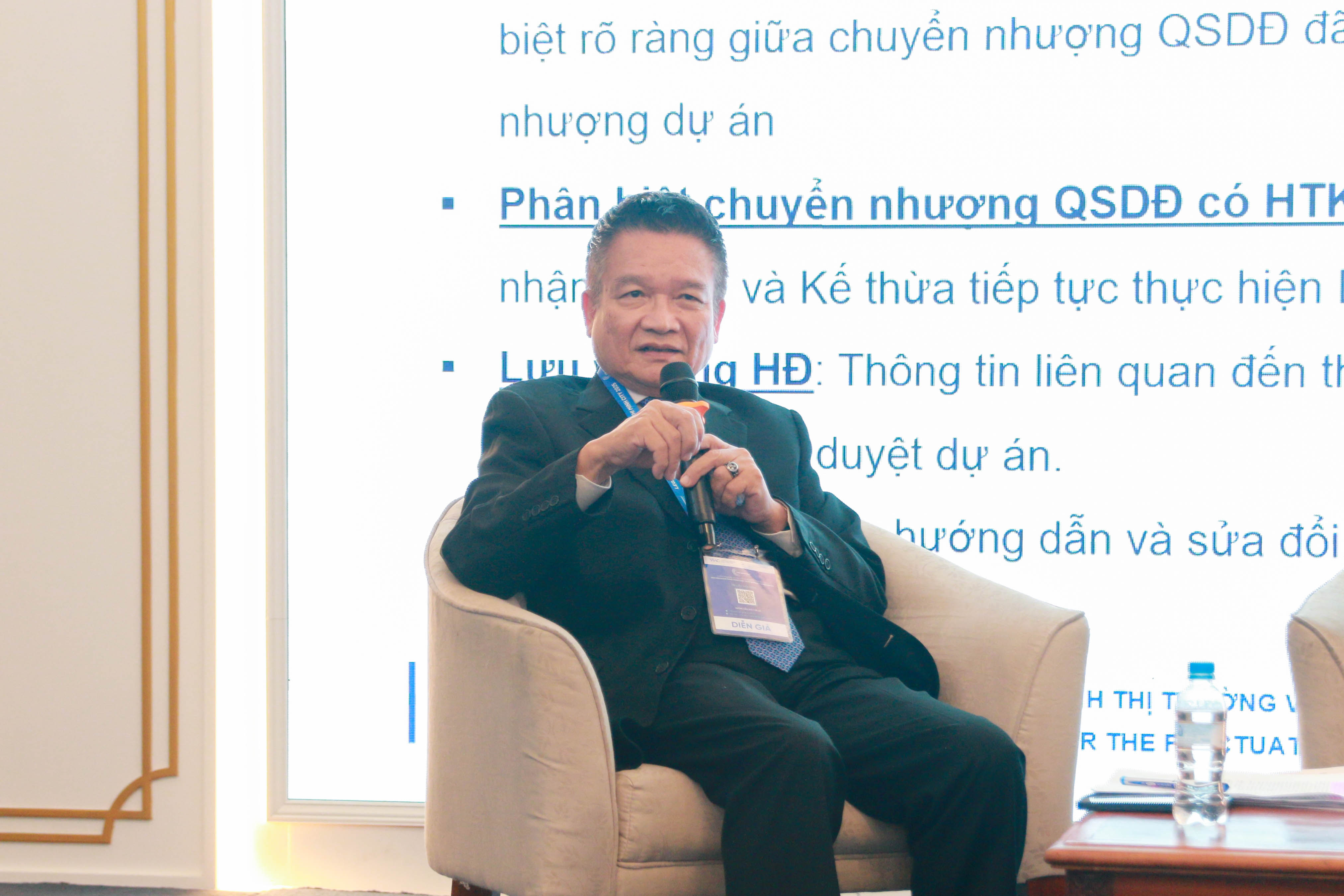
Mr. Lương Văn Lý - Senior Advisor at Global Vietnam Lawyers, VIAC Arbitrator
Mr. Lương Văn Lý identified several existing limitations in the legal regulations governing the transfer of land use rights with infrastructure. He noted that the term “business in land use rights with technical infrastructure” lacks a clear legal definition, often causing confusion with other real estate business forms, especially project transfers. Moreover, the law does not clearly specify the investor status of transferee parties receiving land use rights with infrastructure. Consequently, issues regarding the succession of rights and obligations between the transferor and transferee remain vague, making it difficult to continue the projects.
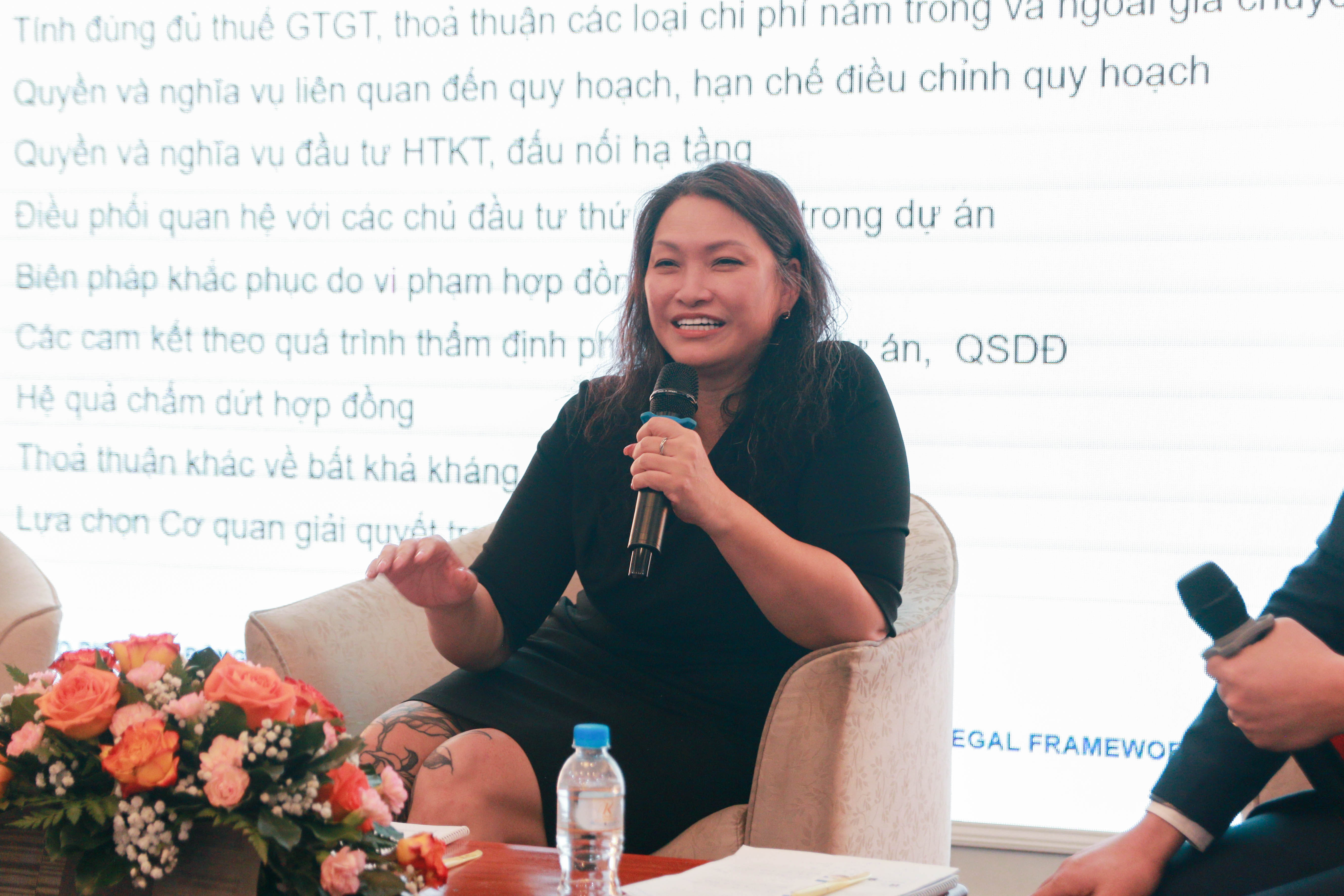
Ms. Nguyễn Trúc Hiền - Partner at Vietnam International Law Firm (VILAF – Hồng Đức)
Agreeing with these points, Ms. Nguyễn Trúc Hiền noted that the law still lacks a clear distinction between the transfer of land use rights with completed technical infrastructure to an organization and the transfer of an entire or partial real estate project. This ambiguity has caused confusion for state authorities in management and created potential risks for the parties involved in such transactions. She explained that, legally, a transfer of land use rights with infrastructure merely grants the transferee the right to use land (already equipped with infrastructure) for construction consistent with approved purposes and conditions. In contrast, a project transfer involves the full or partial transfer of the project, including all associated rights, obligations, and responsibilities. Because of these fundamental differences, she cautioned businesses about potential risks in each transaction type.
For land use rights transfer contracts with infrastructure, risks often arise from unclear identification of parties’ legal status - whether the transferee qualifies as a subsequent investor or merely as a land user. Without clarity, authorities may reject project approval or construction applications, causing delays or suspension. In real estate project transfer contracts, risks typically concern the scope and succession of obligations. The transferee inherits not only the right to exploit the project but also all financial, legal, and contractual responsibilities. Therefore, before entering such transactions, parties must conduct thorough due diligence, and contracts should clearly stipulate principles of succession and allocation of pre- and post-transfer responsibilities.
Panel 2 moderated by Mr. Châu Việt Bắc - Vice Secretary-General of VIAC
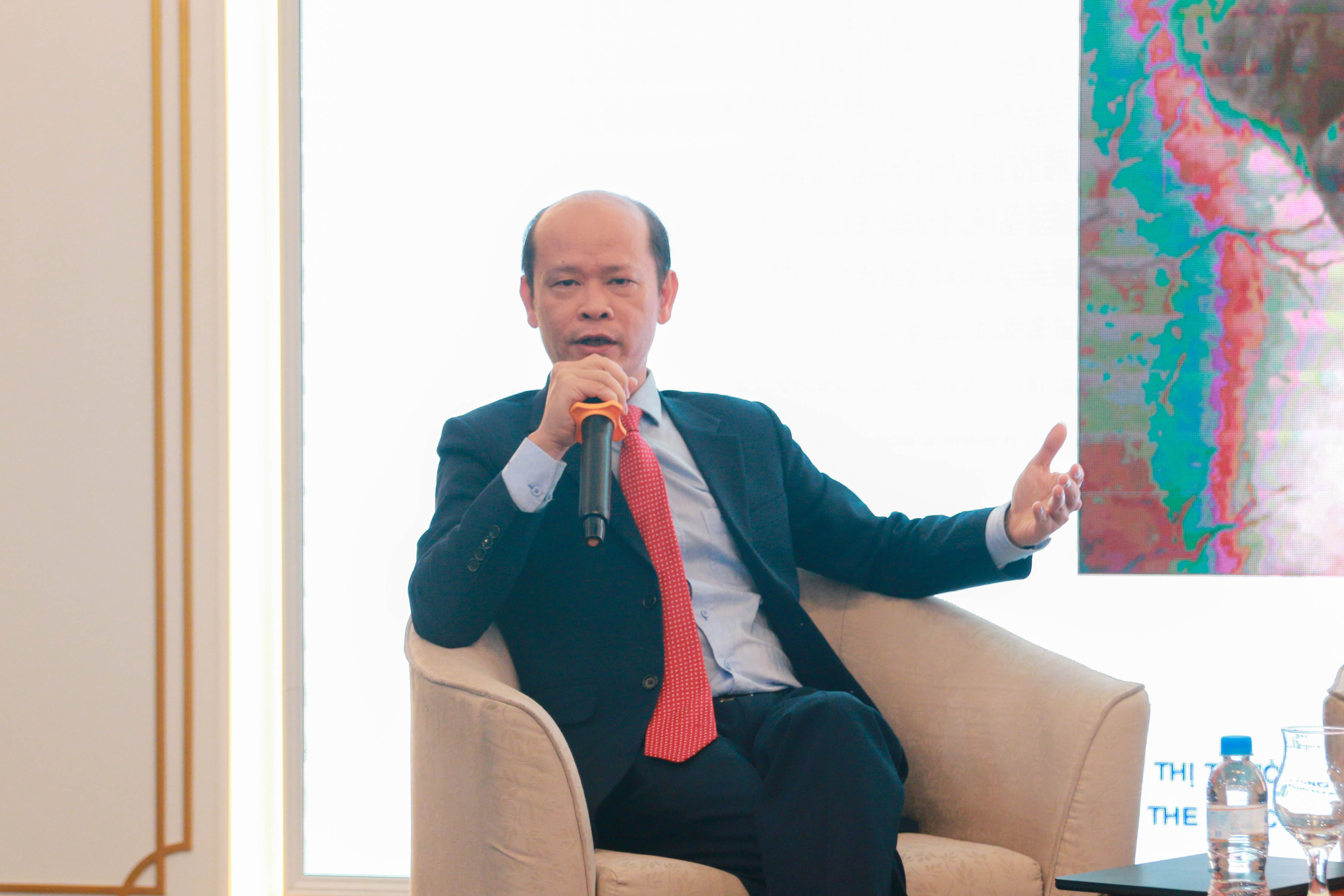
Assoc. Prof. Dr. Võ Trí Hảo - Expert at the Institute of International and Comparative Law, UEL; VIAC’s Arbitrator
According to Assoc. Prof. Dr. Võ Trí Hảo, disputes relating to contracts and transactions for off-plan real estate often stem from developers marketing or selling projects before meeting legal conditions required under the Law on Real Estate Business 2014. In addition, many developers use or interpret terms that are not defined by law, making transactions harder to understand and increasing the likelihood of misunderstandings between parties. Apart from challenges arising from the legal framework itself, breaches of contractual obligations are also common, for instance, when developers fail to meet the committed construction schedule, or conversely, when buyers are unable to make payments on time once the project is completed.
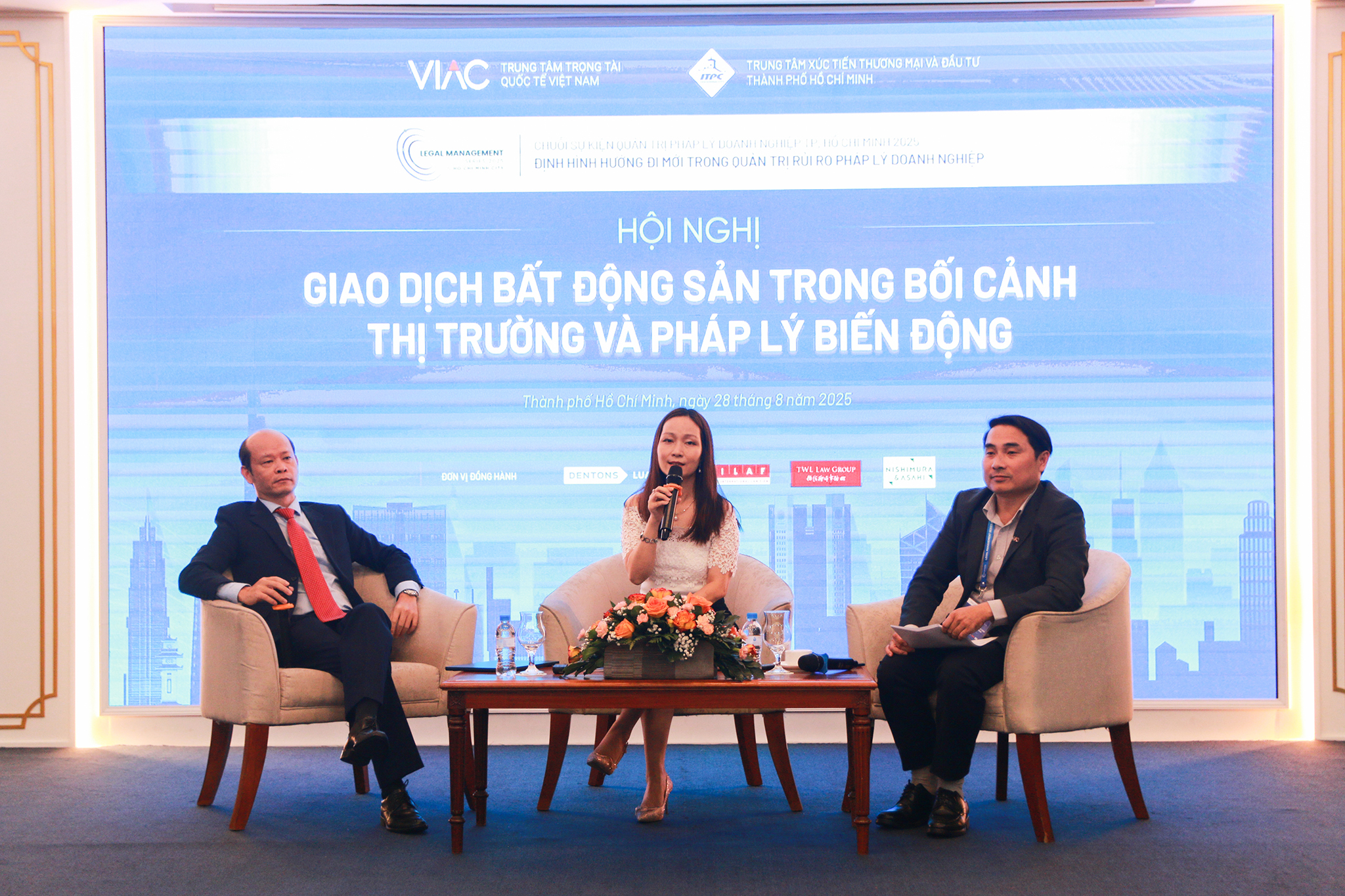 Ms. Vũ Thị Quế - Founding Partner and Chairwoman of Rajah & Tann LCT Lawyers
Ms. Vũ Thị Quế - Founding Partner and Chairwoman of Rajah & Tann LCT Lawyers
From her research and practical experience, Ms. Vũ Thị Quế added that in cross-border transactions, disputes often arise when Vietnamese sellers fail to meet pre-agreed conditions or commitments. Furthermore, concealing or failing to detect defects in projects or project companies during due diligence can expose parties to major risks. In such cases, foreign buyers typically seek protection through clauses such as (i) indemnity and buy-back obligations, (ii) phased transactions, or (iii) assigning responsibility for resolving legal issues to the seller and target company.
Continuing the discussion on transaction risks, Ms. Quế also analyzed capital mobilization practices in the real estate sector, particularly raising funds through deposits. She noted that the Law on Real Estate Business 2023 introduced stricter rules on deposits for purchasing future-formed houses. Nevertheless, many investors continue using unregulated forms such as “reservation fees,” “priority purchase fees,” or “goodwill deposits.” While these methods help improve cash flow, they lack clear legal grounds, creating risks for all parties involved.
Hence, she recommended that enterprises should explore safer and more sustainable capital-raising methods. Regarding guarantees in the sale of off-plan housing, after reviewing the new legal provisions, she offered several notes for developers when negotiating guarantee or mortgage contracts with banks. Negotiations should align with Circular No. 61/2024/TT-NHNN and be considered within the context of the full guarantee documentation set, including guarantee agreements, commitment letters, proposals, and guarantee letters to ensure thoroughness and consistency.
After the two panel discussions, experts engaged with participants through a Q&A session. Numerous practical challenges raised by enterprises received detailed guidance and recommendations from the experts. The conference concluded with valuable contributions and insights, forming a foundation for future proposals to refine and improve the legal framework governing real estate investment and business activities.
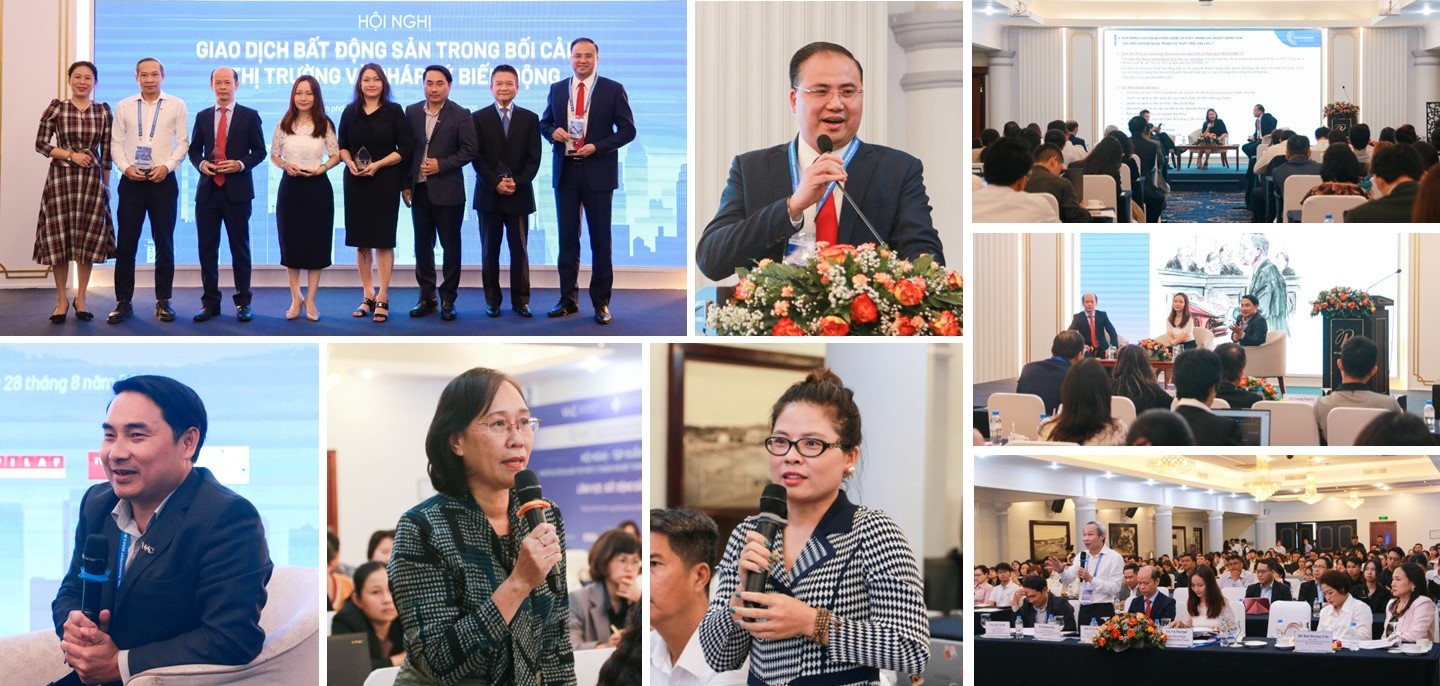
Some photos from the Conference
Related articles about the event:
1. Potential legal risks in real estate transactions - Banking Times
2. Legal reforms create opportunities, but real estate businesses must "actively" avoid risks - Vietnam Financial Times
3. Removing legal obstacles in real estate transactions - Agriculture & Environment Magazine
4. Real estate transactions amidst volatile market and legal context - Nhan Dan news
5. Investors raising capital via deposits and reservations: Lack of legal basis, many potential risks - Vietnam Real Estate Magazine
-------------------------------
INFORMATION ON EVENTS IN THE REAL ESTATE SECTOR | LMS 2025
| Training Workshop "Lease/Sublease agreement of Real estate: Application of new regulations and key considerations in drafting contractual clauses" |
| Online Talkshow "Guarantees in off-plan housing transactions" |